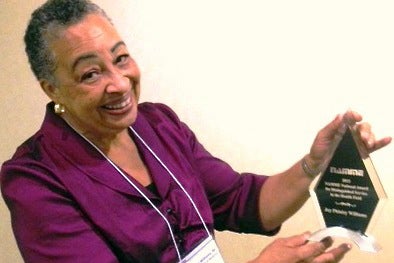Retiring Dean Leaves 35-Year Legacy of Mentoring Disadvantaged Students

Posted in GUMC Stories
 JULY 3, 2014—In 1979, when Joy Phinizy Williams (new window) accepted a job at Georgetown University Medical Center, she thought twice about making a two-year commitment.
JULY 3, 2014—In 1979, when Joy Phinizy Williams (new window) accepted a job at Georgetown University Medical Center, she thought twice about making a two-year commitment.
“I just didn’t know much about Georgetown. I didn’t know, for example, that it was a Jesuit university,” says Williams, senior associate dean for students and special programs at Georgetown University School of Medicine (new window), who retires this month after 35 years of service.
She had come to Georgetown from fast-paced jobs, working in social justice programs in the U.S. Office of Economic Opportunity, The League of Women Voters and the White House.
“But a person told me, shortly after I arrived, that ‘One day you will look back on this conversation and realize Georgetown is family. If you are the right person for this position, you will want to stay,’” says Williams.
Truer words have not been spoken, she says.
“I have been blessed to work with wonderful, wonderful people. We have all enjoyed struggling with the sense that things can always be better, that we are all willing to roll up our sleeves, enlist our intellect and experience to solve problems,” she says. “I will miss them and the students, whom I love.”
‘Special Educational Sauce’
Williams came to the medical school to formalize the Georgetown Experimental Medical Studies (GEMS) Program (new window), a one-year post-baccalaureate experience started by Georgetown medical faculty Arthur Hoyte, MD, and Heinz Bauer, MD. The idea was to recruit and mentor students from disadvantaged backgrounds who are most likely to make a significant contribution to medicine, and whose disadvantaged circumstances may have hindered their academic achievement.
Many of these students have been discouraged from seeking entrance into medical school in a “system that is male- and majority-dominated,” Williams says. “Even just the slightest comment can put off poor, black, Hispanic or other minority students who are keenly interested in becoming doctors.”
Williams put her own brand of passion, which medical school leadership has taken to calling her “special educational sauce,” into her work.
“The students are told that we are here to support them in their desire to become excellent physicians, but that scholarly expectations are high and there are no excuses,” she says. “It’s like a coach on a track team who first tells you how to place your feet, then encourages you to run faster every day.”
Strong Legacy
Now in its 35th year, GEMS is among the longest standing programs of its kind in the nation—and a model for other medical schools.
The GEMS program has graduated 668 disadvantaged and academically high-risk students since its inception, including 385 who have gone on to receive their medical degrees from Georgetown, according to Stephen Ray Mitchell, MD, MBA (new window), dean for medical education at the School of Medicine.
Between 2008 and 2012, 75 percent of GEMS students were admitted to medical school, and the rest have been successful in related health fields.
Mitchell notes that Williams’s advocacy for collaborative learning and peer-to-peer tutoring in GEMS is now practiced throughout the medical school, and has contributed to a more nurturing environment.
Devotion to Her ‘Families’
Williams has also been a voice for progress throughout D.C. Her list of activities is long, and reflects her desire to nurture the career aspirations of more than 5,000 high school and undergraduate students interested in health careers. For this work, she was given the National Association of Medical Minority Educators Award (new window) for Distinguished Service in the Health Field last year.
“Dean Joy Williams over three decades has mentored countless students from our GEMS program, the D.C. community and D.C. public schools. She is beloved in all of those circles as well as the university and the School of Medicine,” says Mitchell.
Williams returns to the idea of family to describe both her experience at Georgetown, and her goals for the future.
“The reality is if something has been done well, it is ‘we,’ not ‘me,’” she says. “I am eternally grateful to the wonderful men and women I have had the opportunity to meet and with whom I have shared, as family, this journey.”
As to the future, she looks forward to an active retirement, including lavishing attention on her mother, who will turn 105 this August.
“I will focus as much attention as I can on my family, my garden, my community — and it will be just great.”
By Renee Twombly,
GUMC Communications
